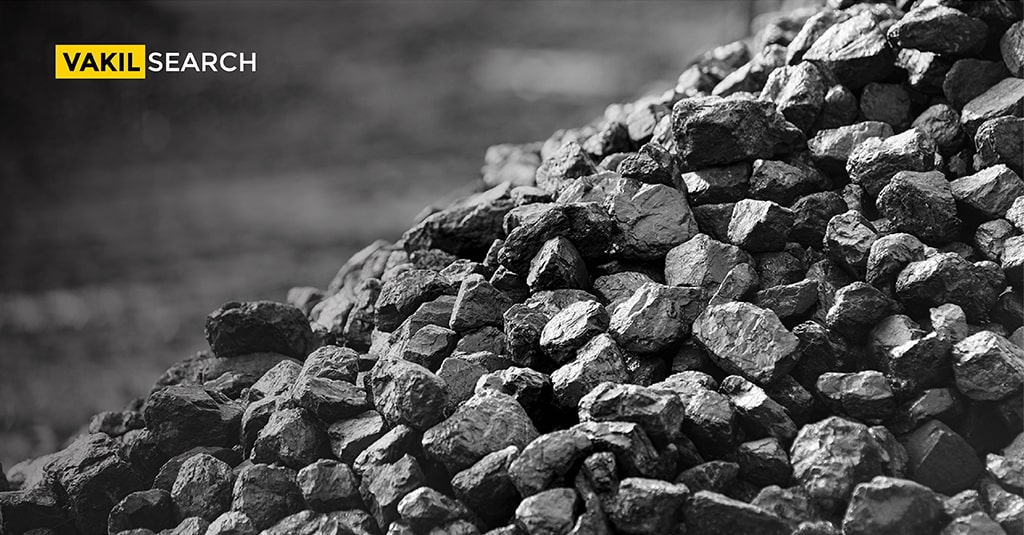The government no longer enjoys a monopoly over the coal industry. It is not only being privatised, but the government has also created a single-window portal to make it easy for anybody to start and run a coal business in India.
India is the fifth-largest global consumer of coal. Almost 70% of our domestic electricity needs are met by coal, which continues to be a major material used for not just energy generation, but also cement and metal production. Last year, the government allowed private players into the coal business.
In February 2021, a new single-window portal was launched to ease compliance. Against the backdrop of rising private investments in the minerals sector, this article highlights the economic significance and prospects for businesses in the coal sector.
Coal in India – the Prospects
- Coal reserves are abundantly found primarily in states in eastern India like Jharkhand, Orissa, and Chhattisgarh, and large swathes of central and southeastern India. The peninsular part of India has older coal deposits, with more than 90% of lignite reserves being found in Tamil Nadu.
- Several other states such as Chattisgarh, Jharkhand, Andhra Pradesh, and Karnataka possess known coal reserves and have already begun commercial auctions.
- In the last four decades, commercial primary energy consumption in India has grown by about 700%. With the rising standard of living and technological advancements in India, the demand for energy from coal is likely to expand exponentially. Check Here to More about: https://coal.nic.in/
New Single-Window Clearance System Launched
- The government has opened a new online single-window clearance portal for the coal sector. This is likely to speed up the operationalization of coal mines.
- Through this portal, successful bidders for coal blocks will be able to obtain all required clearances through a comprehensive application.
- This includes environment and forest clearances, progress monitoring, licenses with multiple authorities, and state departments from a single portal.
- The Parivesh mechanism for forest and environment clearances will also merge into this new single-window portal
There are 19 major approvals and clearances required for starting a business in the coal industry in India. These required businesses to interact with multiple departments, and administrative divisions at the state and central level for getting licenses. Some of these are:
- Mining plan
- Mine closure plan
- Grant of mining lease
- Environment and forest clearances
- Wildlife clearance
- Clearances related to safety & labor laws
- Environment and rehabilitation project plan for affected families
- Policy for the protection of workers
This new portal would also provide details of the relevant application formats and process flow for grants of approvals and clearances. With Vakilsearch’s expertise in getting all your licenses and regulatory approvals in order, you can focus on your business strategy and leave the compliance burden to us. Our experts ensure that you get the best advice specifically to suit your business needs and assistance in PVT Limited company registration process.
What are Mining Leases and Composite Licenses?
There are two types of licenses for the coal business in India. Mining leases can easily be obtained in areas where there is a non-mineral reserve. The composite license is a prospective mining license for preliminary exploration in an unknown area by the government. Coal blocks are to sellers by way of e-auction in a two-stage bidding process. Bidders provide an initial price offer and the government decides the reserve price (minimum price).
No State Monopoly in Coal Since 2020
Last year, the government opened the coal sector to private businesses. Coal India Limited, until now, had singularly produced more than 80% of India’s coal production. Since its setting up in the year 1956 and the subsequent nationalization of coal in the 1970s, Coal India Limited has had an exclusive monopoly in the production of coal. India likely relies on imports and sees limited private participation in the coal sector primarily for this reason.
Focus on Privatisation Under the National Minerals Policy 2019
National Minerals Policy 2019 proposed to grant the status of an “industry” to coal mining activity. This categorization will boost financing of mining for the private sector and for acquisitions of mineral assets in other countries by India’s private sector companies. It would also enable small and medium-sized private company registration and to avail government schemes for the coal business.
Coal India Agreements with Private Businesses
- Recently in February 2021, Coal India Limited also started procuring coal from domestic private power plants, to reduce the import of coal in India
- This presents several business possibilities to utilize indigenous coal while also reducing the cost to other consumer industries of coal. Coal can be raw material to power most other industries in electrical, heavy machinery, and processing segments
- It is also in the use of making cement, steel, and other basic materials. Hence, the overall outlook for a coal-generating company is bright. There are however significant capital costs and the risk of unavailability of large reserves in the licensed area.
Conclusion
It is believed that coal will be the biggest contributor to India’s aim of becoming a $5 trillion economy. This will not just ensure revenue for states and profits for businesses, but also generate employment and reduce the overall import of coal. However, there exist environmental concerns about land degradation and pollution caused by commercial coal mining, protests by tribal groups in various parts of the country, and the global momentum towards switching to alternative and cleaner fuels.

